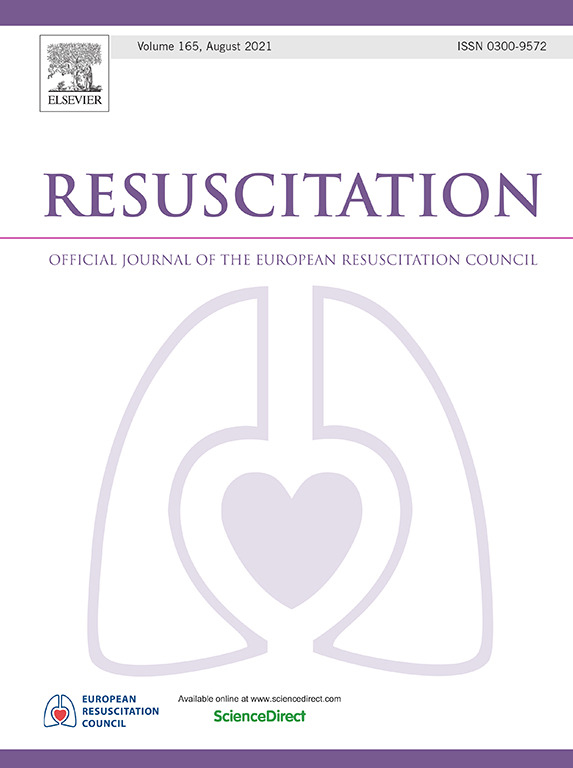The significance of possible non-occlusive mesenteric ischemia in relation to neurological outcomes in patients with refractory cardiac arrest – Secondary analysis of the Prague OHCA study
IF 4.6
1区 医学
Q1 CRITICAL CARE MEDICINE
引用次数: 0
Abstract
Background
Intestinal injury as a consequence of ischemia–reperfusion injury after refractory cardiac arrest is not fully understood. This study evaluates the occurrence of clinical signs reflecting possible non-occlusive mesenteric ischemia (NOMI) to outcomes in patients with refractory cardiac arrest.
Methods
In a post-hoc analysis of a randomized, prospective Prague OHCA study comparing ECPR vs. CPR approaches in refractory out-of-hospital CA, all patients who survived longer than one hour after hospital admission were analyzed. We assessed possible NOMI based on clinical signs (mainly profuse diarrhea and abdominal distension) and their onset within 12 h of admission. Its occurrence was correlated with neurologically unfavorable outcome (Cerebral Performance Category (CPC) Scale 3–5) at 180 days. Cox regression was used to evaluate the relationship of particular variables to adverse neurological outcomes.
Results
Of the 256 study participants, 61 developed possible NOMI: 46 (51.7%) in the ECPR group and 15 (16.5%) in the CPR group. Adverse neurological outcomes occurred in 41 (89%) and nine (60%) patients, respectively. The number of patients developing possible NOMI was higher in those treated with ECPR (p > 0.01). Its occurrence correlated with cardiac arrest length, elevated levels of neuron-specific enolase and procalcitonin at 48 and 72 h. It was independently associated with adverse outcomes. In Cox regression, possible NOMI was associated with poor neurological outcomes in ECPR patients.
Conclusion
The development of profuse diarrhea, abdominal distension and other signs suggesting non-occlusive mesenteric ischemia in patients with refractory out-of-hospital cardiac arrest are observed more frequently in patients with poor neurological outcome at day 180, especially in patients treated with ECPR.
Trial registration: ClinicalTrials.gov: NCT01511666.

难治性心脏骤停患者可能的非闭塞性肠系膜缺血与神经系统预后的关系——布拉格OHCA研究的二次分析。
背景:难治性心脏骤停后缺血再灌注损伤引起的肠道损伤尚不完全清楚。本研究评估了难治性心脏骤停患者可能发生的非闭塞性肠系膜缺血(NOMI)的临床症状对预后的影响。方法:在一项随机、前瞻性布拉格OHCA研究的事后分析中,比较了难治性院外CA的ECPR与CPR方法,分析了所有住院后存活时间超过1小时的患者。我们根据临床症状(主要是大量腹泻和腹胀)和入院后12小时内的发病来评估NOMI的可能性。其发生与180天的神经不良结局(脑功能分类(CPC)量表3-5)相关。Cox回归用于评估特定变量与不良神经预后的关系。结果:在256名研究参与者中,61人发生了可能的NOMI: ECPR组46人(51.7%),CPR组15人(16.5%)。不良神经预后分别发生在41例(89%)和9例(60%)患者中。ECPR组可能发生NOMI的患者数量较高(p < 0.01)。其发生与心脏骤停时间、48小时和72小时神经元特异性烯醇化酶和降钙素原水平升高有关。它与不良结果独立相关。在Cox回归中,可能的NOMI与ECPR患者较差的神经预后相关。结论:难治性院外心脏骤停患者出现大量腹泻、腹胀等提示非闭塞性肠系膜缺血的体征在180天神经系统预后较差的患者中更为常见,特别是在接受ECPR治疗的患者中。试验注册:ClinicalTrials.gov: NCT01511666。
本文章由计算机程序翻译,如有差异,请以英文原文为准。
求助全文
约1分钟内获得全文
求助全文
来源期刊

Resuscitation
医学-急救医学
CiteScore
12.00
自引率
18.50%
发文量
556
审稿时长
21 days
期刊介绍:
Resuscitation is a monthly international and interdisciplinary medical journal. The papers published deal with the aetiology, pathophysiology and prevention of cardiac arrest, resuscitation training, clinical resuscitation, and experimental resuscitation research, although papers relating to animal studies will be published only if they are of exceptional interest and related directly to clinical cardiopulmonary resuscitation. Papers relating to trauma are published occasionally but the majority of these concern traumatic cardiac arrest.
 求助内容:
求助内容: 应助结果提醒方式:
应助结果提醒方式:


